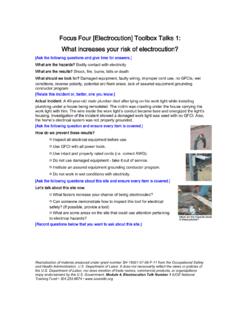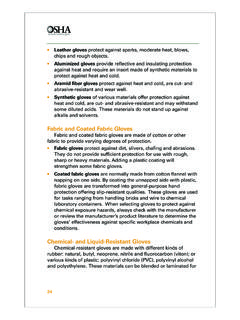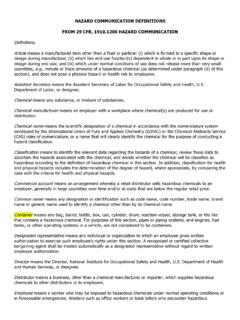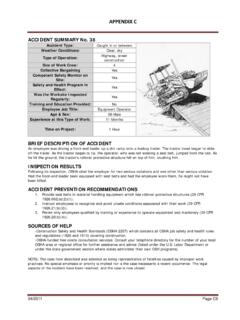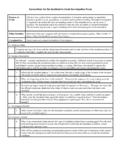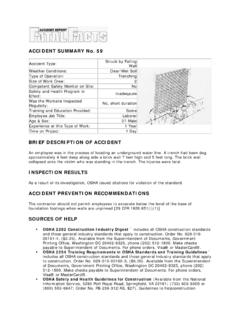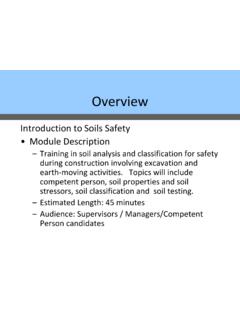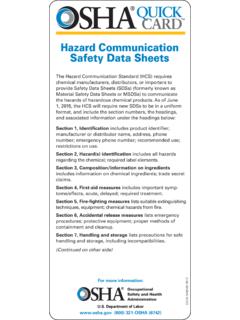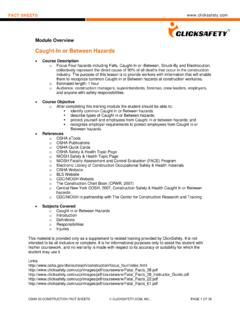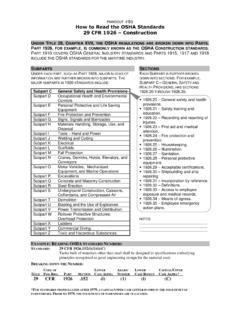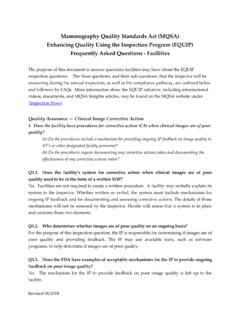Transcription of PRE-TASK / HAZARD RECOGNITION PLAN Project / Equip …
1 PRE-TASK / HAZARD RECOGNITION plan PTP Rev 1, Dec 10 Project / Equip / Sys Description: _____ Date: _____ Time: _____ Work Planner: _____ Phone: _____ Company: _____ Building: _____ Floor: _____ Area: _____ Work Description: _____ Required Permits hazards Safe plan of Action Permit # _____ Material Handling Inspected movement path Identified moving Equip Wheels Chocked Floor Plating (pinch / back ) Hand protection required Awkward size/shape/CG Hand / body positions to avoid injury Laydown area established Spotter Debris Removal plan Dirty Work Permit Energized Elec. Work (EEW) Hot Work (Non-Electrical) Building on test / (smoke / sprinkler) Slips, Trips Falls Inspect for trip / slip hazards Area clean / clear of debris hazards marked Tools & material properly stored Electrical / emer Equip clear Special Permit Confined Space Hand / Cut / Bump hazards Inspected work area for sharp edges Found sharp edges and protected Inspected walking paths Identified bump hazards and marked Critical Lift (Crane)
2 Excavation Task Specific Work Plans Interrupts to Production Area inspected to Identify EMO s |Electrical Connections | Valves | Pipes | Tubing | Fittings | Gauges | Fire Sprinklers | smoke detection | liquid leak detection | AMHS equipment Protected / Guarded or marked Floor / Wall penetrations Lock Out/Tag Out Procedures Line Breaking Hand & Power Tools: Reviewed safety requirements Inspected condition. Guarding OK GFCI in use Identified PPE required Inspected Elec cord Routed cord overhead or taped / barricaded Raised Metal Floor Checklist Equipment Demo Workplans Lifting plan (req d for > 50 pounds) Chemical hazards Area inspected for potential chem.
3 HAZARD MSDS Sheet avail Identify PPE for highest recognized HAZARD (see left side) Reviewed Decon / Disposal or storage procedures Reviewed contingency plan and Equip is on hand Required PPE Hard Hat Safety glasses Face Shield Goggles Hazardous Energies Lock Out/Tag Out/Verify Confirm that equipment is de-energized 1 Lock / 1 Key / 1 Person Double block & bleed Mechanical | Electrical | Chemical | Thermal | Stored | Radiation Gloves: Leather Acid Solvent Kevlar / Cut resistant Arm Sleeves Foot protection: Boots Steel-Toe Toe Covers Non-Electrical Hot Work Fire Extinguishers Fire watch Install weld / spark screens combustible material removed / protected Adequate ventilation Ear Plugs / Ear Muffs Safety Vest Excavation Reviewed as-builts/ Locates Barricades provided Proper sloping/shoring Access/egress provided Excavation Inspected by competent person Hand dig areas are clearly marked (w/in 3 of utilities)
4 Chemical Resistant Suit / apron Respirator Energized Elec Work PPE Scaffolds Competent person inspected daily Condition tags in place Properly secured / wheel locks Toe boards used Footings adequate Additional PPE (see comments) Fall Protection Vehicular Traffic Traffic Barricades Cones Signs Flagmen Lane closure Fire Lane is clear Ladder Inspection completed Retractable Device Required Crane or other Lifting Equipment Lifting / Rigging equipment inspected Tag lines in use Areas barricaded Overhead Utility clearance Verified Signalman assigned Inspected Fall Protection Equip .
5 Shock Absorbing Lanyard Required Horizontal lifeline System Req d. Anchorage Point Identified Barricades Yellow barricade tape Red barricade tape Rigid barricade required / secured to floor Barricade Signage Emergency Egress pathways clearly marked Travel paths barricaded / cones to protect foot traffic Fall Clearance Distance Adequate Fall Rescue/Retrieval plan Set Up Environmental Storm Water Protected Hazardous waste plan Ground protected from metal shavings Dumpsters covered Dust Controls in place Weather Review plans for weather including heat/wind/moisture Liquids available Cool down periods Sun Screen Heat Stress symptoms Crew Congestion / Impact
6 To occupants Inspected areas for potential impacts to other crews / customers Coordinated with adjacent work supervisor/customer USA ticket #_____ JOB / TASK Major Steps of Task: (Include Material Handling / Safe Lifting Plans) Tools Required to do the Job Safely: Recognized HAZARD categories & Additional hazards not captured on front page. Additional Safe plans for hazards Eyewash / Shower Location: _____ Fire Extinguisher Location: _____ Phone Location: _____ TEAM MEMBER SIGNATURES We can work safely today! _____ Foreman or Designee Signature _____ safety (as needed) _____ Instructions: Conduct a walk-through of work area inspecting for hazards .
7 Write the steps of the task. Note possible hazards involved in each step as well as contingencies. In the Safe plan column, provide the corrective actions that will be taken to mitigate the hazards . List tools needed to do the job, additional safety equipment, etc. Did conditions change? STOP the job! Identify control measures. Update the PTP. Communicate!
